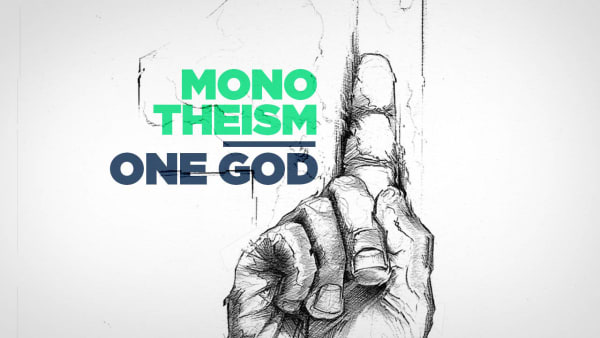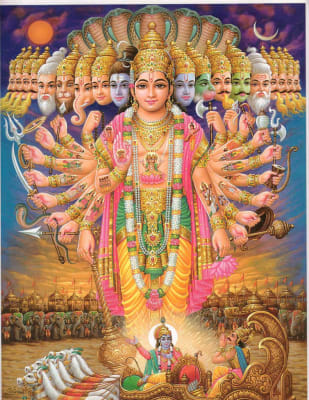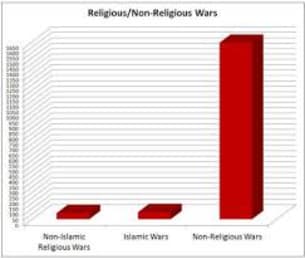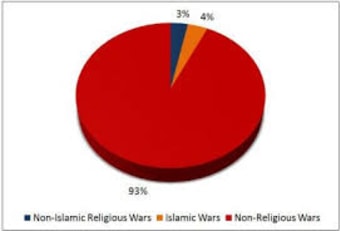The Three Most Asked Questions in Life
From time immemorial, people have asked these three questions:
– Who am I?
– Why am I here?
– What happens when I die?
Four types of people attempt to answer these questions. These four types of people make up the entire human race.
- Monotheists…people who believe in one God. These would include Christians, Muslims and Jews.

- Polytheists…people who believe in many gods. These would include Hindu’s and many other Eastern religions.

- Agnostics…people who aren’t sure or don’t believe that there is enough evidence to believe in any god.
- Atheists…people who don’t believe in any God at all. These people can be called naturalists, materialists and some evolutionists like Richard Dawkins, Daniel Dennett and Sam Harris.

Since most agnostics would answer these questions like atheists, we’ll count them as atheists for the purpose of our discussion.
Atheists believe that mankind evolved from chemicals randomly combining together to produce humans. That we’re just “accidents of nature”. That there is no reality outrside of the physical world. That there is no ultimate purpose in life. That our morality is just an agreed upon set of behaviors. That these behaviors can, do and will change with time. That our morals are nothing more than preferences that help us to survive. Read “Is Morality Relative or Absolute” at https://bsssb-llc.com/is-morality-absolute-or-relative/.
Philosopher Michael Ruse says that “…ethics, as we understand it, is an illusion fobbed off on us by our genes to get us to cooperate…ethics is a shared illusion of the human race.”
Philosopher William Provine says that “There is no ultimate foundation for ethics, no ultimate meaning for life, and no free will for humans either (because our genes determine our actions)”.
Atheists believe that we’re born, we live, we die and that’s it. There is no afterlife. When we die, we just cease to exist. There’s no ultimate purpose in life. Any human desire for a better life is just our brain chemicals reacting in a certain way. There is no absolute right and wrong.

Atheists would answer these three questions like this:
– Who am I? Nobody special. You’re just a conglomeration of chemicals.
– Why am I here? There’s no special purpose for your life at all. You’re just one out of several billion people on one planet out of trillions in the universe.
– What happens after I die? You cease to exist. There is no afterlife.
Polytheists believe in many gods that all merge into one god. This god is not a “he”, it’s an “it”. It is not a personal god but an impersonal one. You have somehow inherited a lot of bad deeds or bad karma. Because most polytheists believe in reincarnation, you must go thru several lifetimes where your good deeds outweigh your bad deeds. When you finally work off all of your bad deeds or your bad karma, your consciousness gets absorbed into “god”. Many polytheists describe it as a drop of water added to the ocean. Your individuality is gone. You don’t exist anymore.
Polytheists would answer the three questions as follows:
– Who am I? Your physical body is an illusion. Your consciousness is the real you. You are a part of god, you just don’t realize it yet.
– Why am I here? To work off your bad karma. They don’t explain how or why you got these bad deeds or bad karma.
– What happens to me when I die? You become part of the universal, impersonal “it”. Your consciousness gets absorbed into the universal, impersonal consciousness.
They don’t believe in an absolute right or wrong as one guru teaches one set of morals and another guru teaches another set.
Monotheists, who believe in one God, answer these three questions in a variety of ways:
– Islamists…
Who am I? You’re a creation of Allah (Quran 95:4).
Why am I here? To obey and serve Allah and to fulfill the five pillars of Islam, which are-
Shahadah – declaring and believing in one God, Allah.
Salah – Praying 5 times a day.
Zakah – giving money to Allah
Sawm – Fasting during Ramadan.
Hajj – Going to Mecca at least once in your lifetime.
Life is a test to show us who are the best in deeds (Quran 49:13 & 67:2)
What happens when I die? If your good deeds outweigh your bad deeds (and you won’t know this until you die), you’ll be welcomed into Islamic heaven. If not, you’ll go to hell (Quran 3:115-116).
– Jews…
Who am I? A creation of God, usually by evolution, to teach the world about God by loving Him and observing His commandments.
Why am I here? To fear God and keep His commandments (Ecclesiastes 12:13) . To believe in a future Messiah sent by God who will deliver the Jews.
What happens when I die? Jews believe in an afterlife. There will be a final judgement where everyone receives a forever physical body. Some people will go to heaven (if they are good Jews in this life) and others will go to a place of torment (Daniel 12:2 & Isaiah 25 & 26).
– Christians…
Who am I? We are people designed in the image of Almighty God, the Creator of the Universe (Genesis 1:28). We have infinite worth because God says we do. Our worth is not based on anything we have done. It is based on the word of the God who created us.
Why am I here? What is the reason for my earthly existence? He made us to freely choose to have a relationship with Him because He loves us. We’re free to have this relationship with Him, to tell other people about Him and to rule over His whole creation as He originally wanted us to (Genesis 1:28). In the meantime, we live as He instructed us to.
What happens when I die? Your body goes into the ground. Your spirit goes up to heaven to be with God. When Jesus returns to this Earth, everyone will be physically resurrected into a new, non-perishable body. Then God will judge everyone. If your sins have been forgiven, while you were alive, you’ll go to heaven for an eternity. If not, you’ll go to hell for an eternity. Either way, God will honor the choice you made in this earthly life.
In heaven, we’ll spend an eternity exploring the resurrected universe and using the talents God had given us to glorify Him. For specifics, take/watch my class entitled Heaven & Hell at https://bsssb-llc.com/video-courses-overview/heaven-and-hell/.
Now, I’d like to ask you the following questions:
1…Which belief system is more appealing?
2…Which belief system is true and matches up with reality?
Atheists say when you die, you cease to exist. Unless you’re an Einstein or Napoleon, you’ll be forgotten in a couple of generations. Your body will decay in
the grave.

Polytheists believe you’ll be absorbed into the great god, Brahma. Your body will decay in the grave. Your individuality will be gone. “You” will be gone. You’ll become like a drop in the ocean.

Monotheists believe in an after-life but only one guarantees a perfect life in heaven.

Atheism doesn’t match up to reality. Any ultimate purpose for our lives is illusory. We’re just one out of billions of people on this planet in this time period. Our planet is just one of trillions of planets circling other stars in billions of years. Sometime in the distant future, our universe will die a “heat death” where nothing can exist. Morality just becomes “preferences”. What’s moral in one time period may not be moral in another. There’s no purpose in our life, no reason for us to exist and when we die, we cease to exist.
Polytheists don’t explain where our bad deeds (karma) come from or why we must work it off. There is no absolute system of morality. Guru’s (polytheists holy men) often contradict each other. They cannot explain the human desire for a better life or where this desire comes from. They cannot explain why humans feel like individuals.
Only Christianity can be proven to match up with reality and is true. Read/watch my class on “Prove to me that God exists” at https://bsssb-llc.com/video-courses-overview/prove-to-me-that-god-exists/. Only Christianity compellingly answers all of these questions. We do have purpose in our life. Our “personality” and our resurrected body will exist for all eternity. We will be rewarded for what we have done in our Earthly life (Revelation 22:12). Our life has purpose and meaning and we live like it does.
Most people don’t think thru these 3 questions. But when they do, it becomes apparent that Christianity answers them compellingly and correctly.
Book reference:
“Reflections on the Existence of God” by Richard E. Simmons III
Here’s to a GREAT eternity,
Dave Maynard
https://bsssb-llc.com








